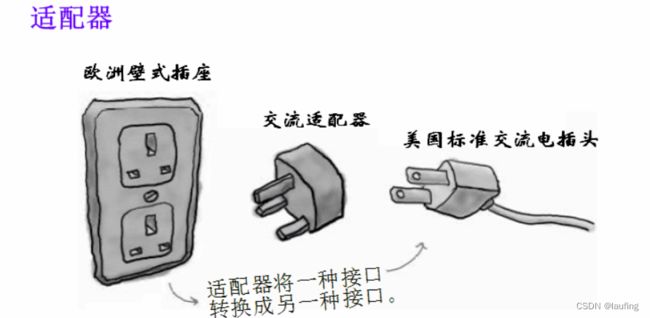23种设计模式-python实现
文章目录
- 五大原则
- 设计模式的类别
- python 实现
-
- 行为型
- 结构型
- 创建型
五大原则
-
单一职责原则(Single responsibility principle)
每个类只完成一项功能,仅有一个引起它变化的原因。
优点:
降低类的复杂度和变更引起的风险;
提高类的可读性,可维护性。 -
接口隔离原则(Interface Segregation Principle)
接口中的方法尽量少,内部的操作尽量不暴露给其他接口。
实现低耦合高内聚。 -
里氏替换原则(Liskov Substitution Principle)
父类适用的地方,子类必定也可以使用。 -
开闭原则(Open Closed Principle)
一个软件实体(如模块、类、函数)对修改代码关闭,扩展功能开放,提高代码的复用性、可维护性。 -
依赖倒置原则(Dependence Inversion Principle)
高层模块不应该依赖于低层模块,二者都应该依赖于抽象;
解耦
继承是增加耦合性,尽量使用组合的方式解耦。
设计模式的类别
- 行为型
策略模式, - 结构型
装饰器模式,适配器模式, - 创建型(5)
单例模式,工厂模式(简单工厂、工厂方法),抽象工厂,原型模式,建造者模式
python 实现
行为型
- 策略模式
类可以根据不同的场景,选择不同的策略算法。
"""
策略模式 行为型
类可以根据不同的场景,选择不同的策略算法。
数据结构:字典
{
场景名字: 策略函数,
}
注册策略,添加key-value
获取策略
"""
# 策略管理类
class StrategyManager:
""" 策略管理类 """
def __init__(self):
self.strategy = {}
def get_strategy(self, scene):
""" 获取策略函数 """
return self.strategy.get(scene)
def register_strategy(self, scene, func):
""" 注册场景策略 """
self.strategy[scene] = func
# 策略类
class Strategy:
""" 策略类, 算法函数实现 """
@staticmethod
def drive_car():
print("驾驶小汽车...")
@staticmethod
def drive_moto():
print("骑摩托车...")
@staticmethod
def drive_bike():
print("骑自行车...")
# 场景类
class Scene:
""" 场景类 """
def __init__(self, name):
self.name = name
if __name__ == '__main__':
strategy_manager = StrategyManager()
# 注册策略
strategy_manager.register_strategy("city", Strategy.drive_car)
strategy_manager.register_strategy("country", Strategy.drive_moto)
strategy_manager.register_strategy("mountain", Strategy.drive_bike)
# 选择山区策略
strategy_manager.get_strategy("mountain")()
结构型
- 装饰器模式
使用类装饰一个对象,不改变其代码的情况下,扩展其功能。
"""
装饰器模式, 结构型
使用类装饰一个对象,不改变其代码的情况下,扩展其功能
普通类(被装饰)
装饰类
包裹类
"""
# 普通类
class Person:
def __init__(self, name):
self.name = name
def intro(self):
print(f"{self.name} 是普通人...")
# 装饰类
class SaiWen:
def __init__(self, person):
self.person = person
def da_gai_shou(self):
print(f"{self.person.name} 是奥特曼, 正在打怪兽...")
# 包裹类
class Wrapper:
def __init__(self, person, deco_class):
self.person = person
self.deco = deco_class(person)
def __getattr__(self, attr):
try:
return getattr(self.person, attr)
except AttributeError:
return getattr(self.deco, attr)
if __name__ == '__main__':
person = Person("jack")
person.intro()
# 装饰person对象
wrapper = Wrapper(person, SaiWen)
wrapper.intro()
wrapper.da_gai_shou()
# 被适配的类
class AliPay:
def ali_pay(self, sum):
print("ali pay $%s" % sum)
class WeichatPay:
def weichat_pay(self, sum):
print("weichat pay $%s" % sum)
# 适配器类
class Adapter:
def __init__(self, pay_mode, pay_api) -> None:
self.pay_mode = pay_mode()
self.pay_api = pay_api
self.check_pay()
def check_pay(self):
if not hasattr(self.pay_mode, self.pay_api):
raise AttributeError(
"Unsupported payment method:%s" % self.payMethod)
def pay(self, sum):
method = getattr(self.pay_mode, self.pay_api)
return method(sum)
if __name__ == "__main__":
# 对支付方案套上适配器
ali_pay = Adapter(AliPay, "ali_pay")
weichat_pay = Adapter(WeichatPay, "weichat_pay")
# 适配到同一个pay的接口
ali_pay.pay(100)
weichat_pay.pay(100)
创建型
- 单例模式
类,只创建一个对象
class Singleton(object):
def __new__(cls, *args, **kwargs):
# 只创建一个对象
if hasattr(cls, "_Singleton__instance"):
return cls.__instance
cls.__instance = object.__new__(cls)
return cls.__instance
def __init__(self, *args, **kwargs):
# 只初始化一次
if hasattr(self, "_Singleton__init"):
return
object.__init__(self)
self.__init = True
def __eq__(self, other):
if self is other:
print("是同一个对象")
else:
print("不是同一个对象")
if __name__ == '__main__':
s = Singleton()
s2 = Singleton()
print(s == s2)
- 工厂模式
简单工厂模式
工厂方法模式
抽象工厂模式
简单工厂
"""
简单工厂模式
将不同的产品类,传入同一个工厂类的函数中;隐藏创建对象的细节,但违反了单一职责的原则
工厂方法模式
将不同的产品类,传入各自的工厂类的函数中,来生成对象。 保持单一职责原则
(也可以使用一个工厂类的静态方法)
"""
# 手机基类
class BasePhone:
def __init__(self, model, color):
self.model = model
self.color = color
def get_info(self):
return "产品信息".center(20, "=") + "\n" \
+ "手机品牌:%s"%self.brand + "\n" \
+ "手机颜色:%s"%self.color
# 华为手机
class HuaweiPhone(BasePhone):
def __init__(self, model, color):
super(HuaweiPhone, self).__init__(model, color)
self.brand = __class__.__name__
# OPPO
class OPPOPhone(BasePhone):
def __init__(self, model, color):
super(OPPOPhone, self).__init__(model, color)
# self可以省略
self.brand = self.__class__.__name__
# (一个)工厂类--> 简单工厂模式
class Factory:
def produce(self, phone_class, *args):
"""
phone_class: 产品类;
model: 产品模式;
color: 产品颜色
"""
phone = phone_class(*args)
return phone
if __name__ == '__main__':
factory = Factory()
huawei_phone = factory.produce(HuaweiPhone, "4G", "天蓝色")
print(huawei_phone.get_info())
抽象的工厂模式
"""
抽象的工厂
"""
# 生产奔驰轮胎的厂商
class BenzTiresFactory:
def get_info(self):
return "tires made by Benz"
# 生产奔驰底盘的厂商
class BenzChassisFactory:
def get_info(self):
return "chassis made by Benz"
# 生产奔驰其他零部件的厂商
class BenzOtherFactory:
def get_info(self):
return "other made by Benz"
# 奔驰车类
class BenzCar:
def __init__(self, color):
self.brand = self.__class__.__name__[:-3]
self.color = color
self.tires = None
self.chassis = None
self.other = None
def get_info(self):
return "车辆信息".center(20, "=") + "\n" \
+ "品牌:%s"%self.brand + "\n" \
+ "颜色:%s"%self.color
# 工厂类
class BenzFactory:
def __init__(self, color):
self.car = BenzCar(color)
def build_car(self, tires_factory, chassis_factory, other_factory):
# 由厂家内部根据指定零件厂商,开始制造零件
self.make_tires(tires_factory)
self.make_chassis(chassis_factory)
self.make_other(other_factory)
def get_car(self):
return self.car
def make_tires(self, tires_factory):
tires = tires_factory()
self.car.tires = tires
def make_chassis(self, chassis_factory):
chassis = chassis_factory()
self.car.chassis = chassis
def make_other(self, other_factory):
other = other_factory()
self.car.other = other
# 品牌专卖店
class BenzStore:
def buy_car(self, color):
# 颜色
self.factory = BenzFactory(color)
# 轮胎、底盘、其他零件均为奔驰制造
self.factory.build_car(BenzTiresFactory, BenzChassisFactory, BenzOtherFactory)
#
return self.factory.get_car()
if __name__ == "__main__":
# 实例化奔驰专卖店
benz_store = BenzStore()
# 去专卖店买车
benz_car = benz_store.buy_car("black")
print(benz_car.get_info())
- 原型模式
创建一个对象模板,复制出多个重复的对象,并修改其属性值。
简化对象的创建(不受构造函数的影响),提高性能,节约内容。
注意:复制对象会执行__new__,不会执行__init__。

from copy import copy, deepcopy
# 手机原型
class PhonePrototype:
def __init__(self) -> None:
self.cpu = None
self.color = None
def get_info(self):
return "cpu: %s\ncolor: %s" % (self.cpu, self.color)
# 原型建造类
class Prototype:
def __init__(self) -> None:
self.prototype = PhonePrototype()
def get_phone(self, cpu, color):
phone = deepcopy(self.prototype)
phone.__dict__.update({"cpu": cpu, "color": color})
return phone
if __name__ == "__main__":
pro = Prototype()
phone1 = pro.get_phone(cpu="Intel", color="black")
phone2 = pro.get_phone(cpu="AMD", color="blue")
print("手机1:\n", phone1.get_info())
print("手机2:\n", phone2.get_info())
- 建造者模式
使用简单的对象,一步一步地构建出复杂的对象。
可以对过程进行精细化控制;产品必须有共同点,范围有限制。
# 产品类
class Product:
def __init__(self) -> None:
self.hamburger = None
self.coke = None
def __str__(self) -> str:
return "Product".center(20, "=") + \
"\n" + ("hamburger : %s" % self.hamburger).center(20, " ") + \
"\n" + ("coke : %s" % self.coke).center(20, " ") + \
"\n" + "=" * 20
# 套餐1
class BeefPackage:
def __init__(self) -> None:
self.product = Product()
def build_hamburger(self):
self.product.hamburger = "Beaf Hamburger"
def build_coke(self):
self.product.coke = "Coca Cola"
# 套餐2
class ChickenPackage:
def __init__(self) -> None:
self.product = Product()
def build_hamburger(self):
self.product.hamburger = "Chicken Hamburger"
def build_coke(self):
self.product.coke = "Pepsi Cola"
# 建造者类
class Store:
def get_product(self):
package = None
choice = input(
"Please Choice Your Package\na.Beef Package\nb.Chicken Package\n>>> ").strip()
if choice == "a":
package = BeefPackage()
elif choice == "b":
package = ChickenPackage()
else:
raise ValueError("don't have package choice %r" % choice)
# 建造食品
package.build_hamburger()
package.build_coke()
return package.product
if __name__ == "__main__":
s = Store()
product = s.get_product()
print(product)
